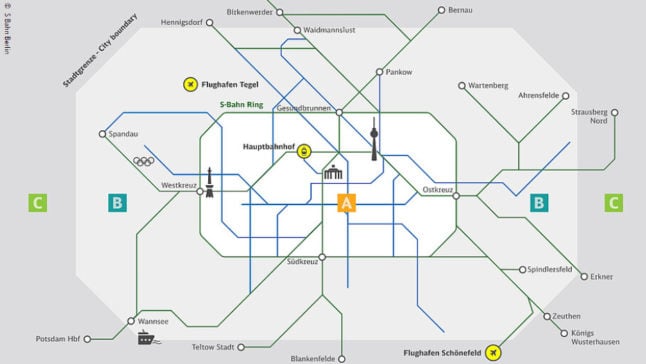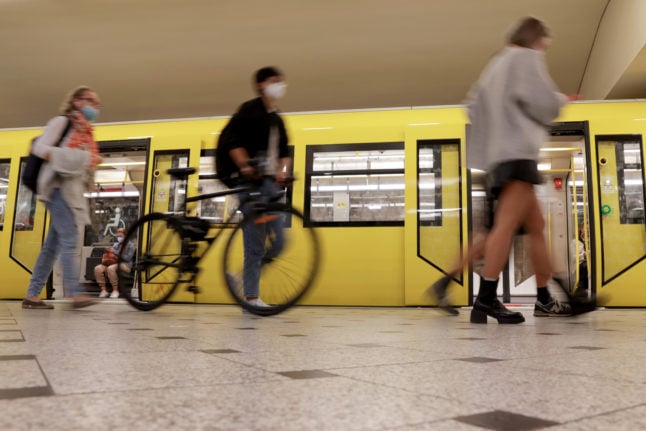So Berlin’s getting a new €9 ticket? Cool!
Kind of. Last Thursday, the Berlin Senate agreed to implement a €29 monthly ticket from October 1st until December 31st this year.
It’s designed to bridge the gap between the end of the €9 ticket deal and the introduction of a new national transport deal that’s due to come into force by January 2023.
The Senate still hasn’t fleshed out the details in a written decision yet, so some aspects of the ticket aren’t clear, but we do know a few things about how it’ll work. For €29 a month, people can get unlimited travel on all modes of public transport in Berlin transport zones A and B. That means buses, trains and trams are all covered – but things like taxis aren’t.
Wait – just zones A and B. Why’s that?
One of the sticking points in planning the new ticket was the fact that neighbouring state Brandenburg was reluctant to support the idea. Franziska Giffey (SPD), the governing mayor of Berlin, had annoyed her neighbours and surprised her own coalition partners by suddenly pitching the idea at the end of August – shortly before the €9 ticket was due to expire.
At the time, the disgruntled Brandenburg state premier Dietmar Woidke (SPD) complained about the lack of advance notice for a proper debate. He had previously ruled out a successor to the €9 ticket in the state. Meanwhile, the CDU – who are part of the governing coalition in Brandenburg – slammed the idea for a new cheap ticket as a “waste of money” and an attempt to “buy votes” for the SPD.
The blockade meant that plans for a Berlin-Brandenburg ticket run by transport operator VBB had to be scrapped, and the monthly ticket has instead been restricted to the two transport zones solely operated by Berlin’s BVG. Since zone C stretches into Brandenburg, Berlin couldn’t include this zone in the ticket unilaterally.

The good news is that zones A and B cover everything within the city’s borders, taking you as far as Spandau in the west and Grunau in the southeast. So unless you plan regular trips out to the Brandenburg, you should be fine.
However, keep in mind that the Berlin-Brandenburg BER airport is in zone C, so you’ll need an ‘add-on’ ticket to travel to and from there. It’s also not great for the many people who live in Potsdam in Brandenburg and commute into Berlin regularly.
READ ALSO: Berlin gets green light to launch €29 transport ticket
How can people get hold of it?
Unlike the €9 ticket, you won’t be able to buy it at stations on a monthly basis. Instead, the €29 ticket is only for people who take out a monthly ‘Abo’ (subscription) for zones A and B. If you’ve already got a monthly subscription, the lower price will be deducted automatically, while yearly Abo-holders will likely get a refund.
You can take out a monthly subscription on the BVG website here – though, at the time of writing, the price of the ticket hadn’t been updated yet. According to Giffey, people will be able to terminate their subscription at the end of December without facing a penalty.
What types of ‘Abos’ are eligible for the deal?
According to Berlin transport operator BVG, people with the following subscriptions are set to benefit from the reduced price from October to December:
- VBB-Umweltkarten with monthly and annual direct debit
- 10 o’clock tickets with monthly and yearly direct debit
- VBB-Firmentickets with monthly and yearly direct debit
- Trainee subscriptions with monthly direct debit
People who already have reduced-price subscriptions, such as over-65s and benefits claimants, aren’t set to see any further reductions. That’s because many of these subscriptions already work out at under €29 per month for zones A and B.

Can students with a Semesterticket get it as well?
That’s one of the things that still needs to be clarified. It’s possible that universities will choose to refund part of the Semesterticket price like they did with the €9 ticket. The Local has contacted BVG for more information.
Can I take my bike/dog/significant other along for the ride?
Once again, this doesn’t appear to have been ironed out yet – but we can assume that the usual rules of your monthly or yearly subscription will apply. So, as with the €9 ticket, if your bike is included in your subscription, you can continue to take it with you. If not, you’ll probably have to pay for a bike ticket.
In most cases, monthly BVG subscriptions allow you to take one dog with you for free, and also bring one adult and up to three children (under 14) with you on the train on evenings and weekends. These rules are likely to stay the same, but we’ll update you as soon as we know more.
How much is this all going to cost?
According to regional radio station RBB24, around €105 million is set to be put aside in order to subsidise the temporary ticket. However, this still needs to be formalised in a supplementary budget and given the green light in the Senate.

OK. And what happens after the €29 ticket?
That’s the million – or, rather, billion – euro question right now. In its latest package of inflation relief measures, the federal government said it would be making €1.5 billion available for a follow-up to the €9 ticket.
The ticket is set to be introduced by January 2023 and will rely on Germany’s 16 states matching or exceeding the federal government’s €1.5 billion cash injection. So far, it looks set to be a monthly ticket that can be used on public transport nationally, with the price set somewhere between €49 and €69.
However, the Greens continue to push for a two-tier model that would give passengers the option of buying either a regional or national ticket. Under their proposals, the regional tickets would cost €29 and the national tickets would cost €69.
READ ALSO:
- What we know so far about the successor to Germany’s €9 ticket
- How the Greens want to replace Germany’s €9 ticket deal



 Please whitelist us to continue reading.
Please whitelist us to continue reading.
Member comments